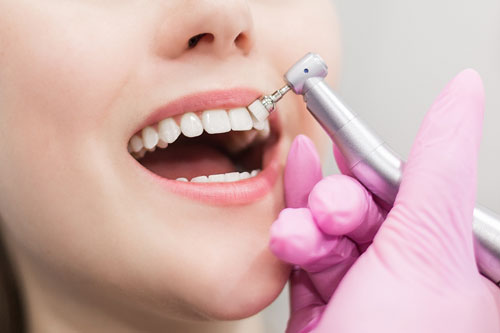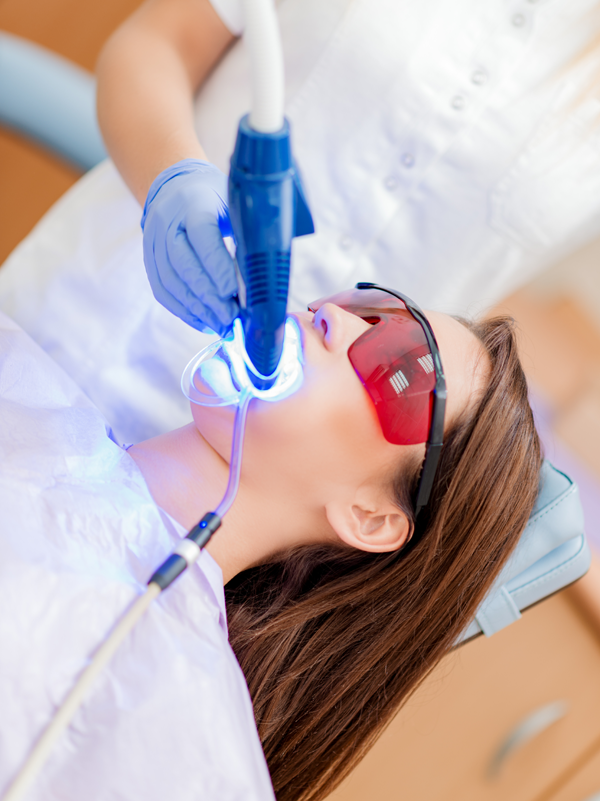Whitening of teeth can be done by at home methods or professional whitening under a dentist.Hydrogen peroxide is used in many over-the-counter (OTC) and in dental clinic treatment options to break down and minimize stains on your teeth. Carbamide peroxide, another oxidizing ingredient, is also used. It is very important to use bleaching agents as directed by the dentist since these chemicals can be harmful in higher doses.

Home whitening kits
Home whitening kits may take the form of a gel or paste that is applied to your teeth using a brush and customised trays. There is a low concentration of bleaching agent approved for home use , than what you would find at the dental clinic. The active ingredients in whitening kits approved by home use are at a lower concentration than you would find in a dentist’s office. For that reason, you will need to use the kit every day for several weeks to see visible results. Most at-home whitening kits advertise results within 2 to 4 weeks.
Whitening at Dental clinics
Tooth whitening at the dentist’s office uses higher concentrations of active ingredients to achieve visible results more quickly.
Power bleaching at the dentist’s office involves rinsing your teeth with a powerful hydrogen peroxide solution for 20 to 30 minutes. Laser therapy is sometimes included in in-office tooth whitening sessions, though there is currently no strong research proving that this has any particular whitening benefit
Teeth whitening side effects
- The most common side effect of teeth whitening is temporary tooth sensitivity. Mouth and gum irritation is also common. Hydrogen peroxide especially can cause this reaction.
- When you get your teeth whitened at the dental clinic, your gum tissue will be protected during the treatment to reduce this side effect.
- You may also experience increased tooth sensitivity after whitening with an at-home kit or at the dentist’s office. Tooth sensitivity can occur when consuming particularly hot or cold food and drinks. It can also feel like a sharp pain in your tooth, sometimes out of nowhere. This sensitivity should be temporary.
Who needs Teeth Whitening?
Health of the tooth is most important and the esthetic appearance comes secondary. Tooth yellowing can occur due to:
- Excessive drinking of soda, coffee, wine
- Tobacco chewing and smoking
- Ageing in individuals
- Tetracycline and other medications
- Genetically yellow
Access to teeth whitening treatment may also depend on your budget. Whitening products and in-office treatments are not covered by insurance. Some people may choose options that have a milder whitening effect but are more affordable, like toothpastes and mouthwashes.
People who have dental implants or veneers are not candidates for teeth whitening. Teeth whitening works on natural teeth only. Many younger people in recent years have pursued veneers to achieve a perfectly white smile, but this can be dangerous for your teeth’s health in the long run.
If you are self-conscious about your smile because of teeth yellowing and you have your natural teeth, you might want to try teeth whitening methods. But ultimately this is a personal aesthetic choice and not a medical necessity.
Consult Gurgaon Dental Lounge experts about what whitening options may be best for you. Always read directions on home kits and use products as directed.
It’s important to note that people with dental implants, veneers, crowns, or bridges might not be candidates for teeth whitening, depending on the location of this dental work. If it is in the back of the mouth, a person may still receive whitening. If is in the front of the mouth, whitening is not recommended.
Regardless of what you decide, there’s no reason to be ashamed of your smile. The most important thing is that your teeth are healthy and functional. While many people find tooth whitening increases self-confidence, it’s important we reduce the stigma surrounding the wide, natural diversity of smiles.
